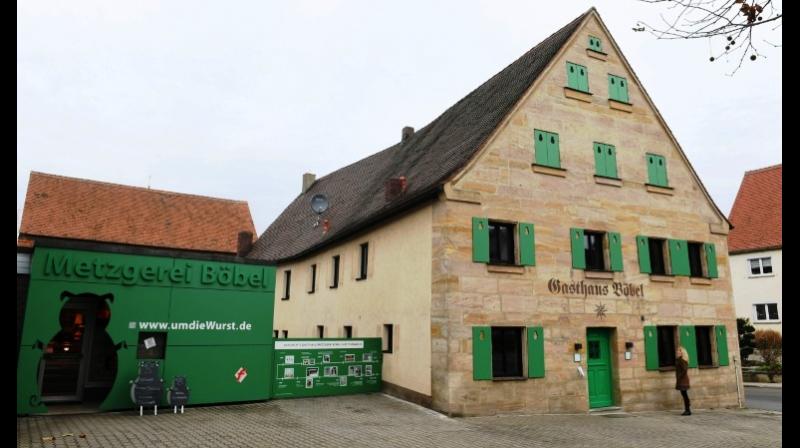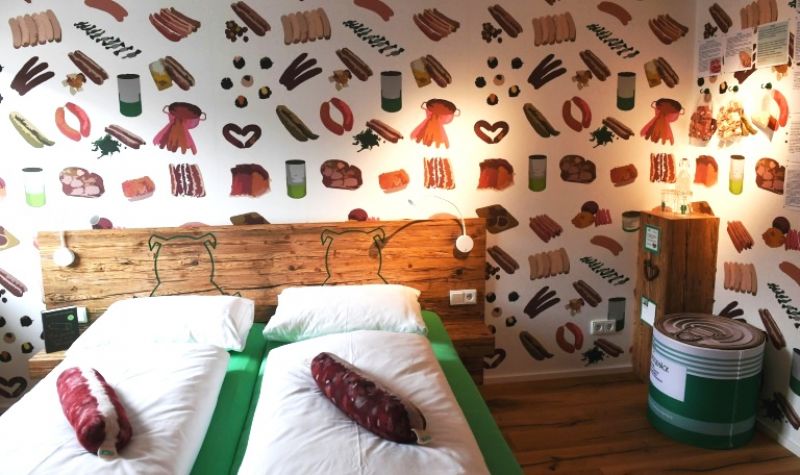Wurst' kind of love
If you love a good Wurst or simply are a foodie, head to this sausage-centric hotel in Germany.

Sausages on the menu, sausage motifs on the wallpaper, sausage mobiles hanging from the ceiling and to top it off, a sausage-shaped pillow on your bed. What sounds like a vegetarian's nightmare is the audacious dream-come-true of Claus Boebel, a fourth-generation butcher and proprietor, of what he calls the world's first and only sausage-themed hotel.
In the narrow lobby of the hotel, the word "sausage" is emblazoned on the wall in the languages of the world including Russian (kolbasa), Japanese (soseji) and Greek (loukaniko). The decor includes coat racks recalling butcher's knives and giant pigs on the frosted glass doors to the bathrooms, where sausage-shaped soap awaits in the shower.
Located in a tidy village, a 40-minute drive south of the German city of Nuremberg, the Bratwurst Hotel has done brisk business since its opening in September, with guests from across Europe and overseas popping in for a visit.
 The sausage-themed hotel has opened in Germany to help keep the village butcher's shop alive. (Photo: AFP)
The sausage-themed hotel has opened in Germany to help keep the village butcher's shop alive. (Photo: AFP)
In a slope-roofed stone house, the inn with seven rooms and two conference spaces caters to foodies and tourists looking for a splash of local colour.
Behind the quirky initiative is a Hail Mary bid to keep alive the local butcher's shop – an institution in most towns that was once a pillar of Germany's "Mittelstand" economy of small and medium-sized businesses – in the face of big-box store competition and slacking meat consumption.
"I want to show that small craftsman shops like mine can survive when you have clever ideas," said Boebel, seated on a stool shaped like a tin of minced sausage. "Plus I love life here in the countryside and, rather than leave, want to draw customers here to Rittersbach," population 300, he added.
The Boebel family has produced and sold meats here since the 19th century. But Sunday roasts, big multi-generational meals at home and a heavily carnivorous diet are fading from German life, with meat consumption down eight percent since 1991.
Even the number of German butcher's shops has tumbled in recent years to just over 12,300 in 2017, with 1,100 folding that year alone, according to industry data.
Older proprietors often can't find a successor when they retire, or they succumb to the stiff competition from big supermarket chains, discounters and even Amazon.
It's not the first time he's got creative to promote his brand, beginning in 2003 with his "Wurstbrief", or sausage letter, featuring a vacuum-packed envelope with the meat and a postcard inside ready for mailing to friends and family.
Boebel's bright green delivery car -- matching the hotel's wooden window shutters and the striking facade of the butcher's shop -- zips through the village's narrow roads as a "Wurst taxi" bringing meat to hungry customers.
Never one to dream small, Boebel also launched a global online shop, sending his canned wares made from locally sourced livestock to a clientele in far-flung places like Hawaii and Jamaica. But the hotel, in which he's invested some 700,000 euros (USD800,000) in the renovation, takes things to another level.

